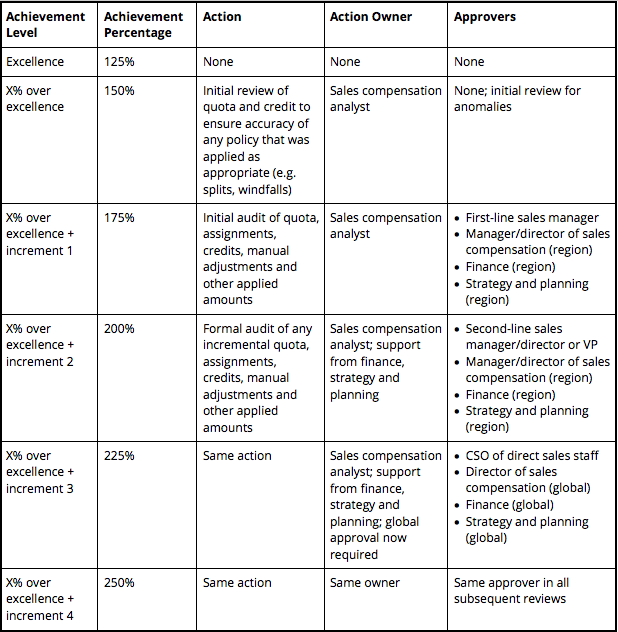No Caps! Making Sales and Finance Happy With Compensation Authorizations
- Schedules of authorizations document the decisions required to administer sales compensation programs and delegate decisionmaking authority
- Having sales leaders self-govern certain compensation events (e.g. large payouts) and sales operations validate account crediting increases sales’ credibility with finance
- Including an approval step at very high achievement levels mitigates the need for compensation plan caps and permits sales reps to continue on the path to high earnings
In a memorable scene from the Disney/Pixar movie The Incredibles, eccentric fashion designer Edna Mode gives strong advice to her superhero customers on their new suits – “NO CAPES!” Edna stressed that a cape would not only limit movement but also could prove quite dangerous to the superhero wearing it.
Similarly, compensation plan caps pose a danger to sales performance because they degrade morale and break trust by limiting the earnings of sales reps despite the results they’ve delivered to the company. Furthermore, they disincentivize selling and increase attrition, especially among high-performing reps.
While caps may appear to be an attractive financial option to planners and finance, their expected savings is often offset by increased attrition; lost opportunity in uncovered territories; and increases in turnover, recruiting and training expenses. When distracted by compensation, reps lose focus on selling and high achievers start to look elsewhere for opportunities with companies that don’t cap their earnings.
At SiriusDecisions, some of the most common justifications we hear for including caps in compensation plans are to mitigate risks associated with poorly set quota (too low) or high payouts for windfall deals. Other issues may also generate very high achievement, such as inaccurately set-up systems, data feed errors and manual data entry errors. Rather than apply caps when very high achievement occurs, define policies and authorizations regarding these risks as part of any sales incentive policy and schedule of authorizations.
Start by adding a review and approval process for very high achievement at increasing achievement levels. This process identifies payout risks, ideally before payments are made to sales reps. The right achievement percentage at which to start the review and approval process depends on the financial risk an organization is willing to take, the range of overachievement the organization typically experiences, and the capacity and cost required to support the process. Defining the next percentage achievement level for subsequent reviews and approvals is also necessary – reviewing this once isn’t sufficient. Establish achievement levels that kick off the review process to ensure repeat or new issues aren’t unexpectedly influencing achievement and payouts. With this additional authorization, capping becomes increasingly unnecessary to manage payout risks.
An example of a schedule of authorizations with new approval thresholds is provided below:

The incremental achievement percentages that drive additional reviews depend on the range of overachievement your sales function normally experiences. If the range above excellence is narrow, you may opt for something less than the 25 percent in this example. If the range is wider, a larger increment may be needed to drive an efficient and affordable process.
When deciding on these increments, consider who needs to drive the audit and the approvals. Additionally, consider the time needed before payroll cutoff dates – no one wants to get a check for something only to have it clawed back, especially in December – remember the tax implications for sales reps!
If you need to protect your organization from unearned payouts, drive a positive sales experience or improve your brand reputation with sales talent – or possibly all three – an authorization step for very high achievement is a great alternative to capping earnings. And don’t forget to put it in your sales compensation policy!